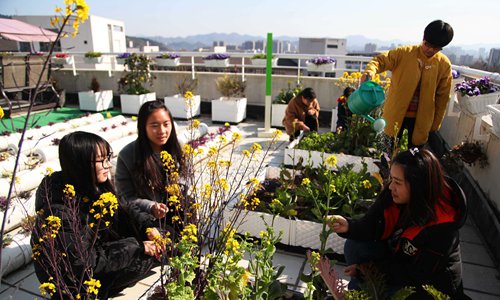
Students at the agricultural college of Zhejiang A&F University examine crops growing on the rooftop of the teaching building on March 6, 2017. (Photo: VCG)
Since last December, six Chinese universities have announced decisions to establish agricultural schools or institutions, marking a renaissance for the traditional discipline.
Peking University, Nanjing University, Zhongshan University, the University of the Chinese Academy of Sciences, Hohai University and Zhengzhou University have all established agricultural schools.
Most of China's comprehensive universities stopped offering programs in agriculture in the 1950s, and the discipline is only taught in specialized universities and colleges. Experts say the recent efforts by universities to reestablish agricultural schools is academia's response to the government's plan to vitalize rural areas, and shows China's emphasis on and investment in modern agriculture.
Amid a nationwide restructuring of China's higher education institutions in 1952, China closed agricultural colleges and departments in its comprehensive universities to form special agricultural universities.
One example is the Huazhong Agricultural University, which was founded by merging the agricultural colleges of five universities including Wuhan University, Henan University and Zhongshan University.
But as the country moved toward a market economy, agricultural colleges and universities became increasingly marginalized, especially when students vied to study sought-after majors like economics, computer science and biology.
According to a paper on agriculture and forestry universities by Chen Ran, a PhD candidate from Xiamen University, since agriculture is considered a weak industry, agricultural universities are often disadvantaged in market competition. Society has a bias against agricultural and forestry universities, making it difficult for them to attract high-quality students, teachers and funding.
Experts say as China puts rural vitalization on its agenda, China's agriculture universities, which designed their faculty and majors in the 1950s, can no longer meet today's needs.
This February, China released the "No. 1 central document" of the year, charting the roadmap for rural vitalization. According to the document, China aims to modernize its rural sector by 2035.
"Issues relating to agriculture, rural areas, and rural people are fundamental to China as they directly concern our country's stability and our people's well being," the document reads.
Deng Xingwang, a research fellow of US National Academy of Sciences who returned to Peking University in 2014, was among the first who raised the idea of establishing the School of Advanced Agricultural Sciences in Peking University.
Son of a farmer from Hunan province, Deng has experienced the rural and urban lives in both China and the US, and thinks China's agriculture industry still lags far behind developed countries. He hopes as China modernizes its agriculture, farmers can have the same social status as college professors. To achieve this goal, he thinks the best way is to cultivate talent in a top Chinese university.
After three years of preparation, Peking University established the School of Advanced Agricultural Sciences in December 2017.
"The current 'fever' on agriculture is the academia's response to rural vitalization. Serving agriculture, rural areas and rural people and participating in rural vitalization are the historic mission and responsibility of higher institutions," Yan Changjie, dean of the Agricultural College of Yangzhou University, told Yangtze Evening News.
"Our country faces challenges in managing land resources and water resources. We have never faced a tougher challenge in food security than today. Developing modern agriculture is a general trend, and investment in the field is a general trend," Chen Yulin, Party secretary of the College of Agricultural Engineering, Hohai University, told China Newsweek.
Another reason why universities are establishing agriculture schools is that it's relatively easier to achieve research advancements in the field, compared with popular disciplines such as computer science and economics.


